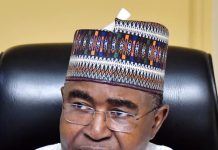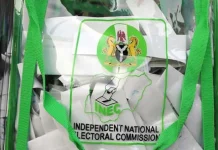Festus Keyamo, who serves as the Minister of State for Labour and Employment, has urged the Federal Government to give serious consideration to the possibility of appointing different ministers to handle individual portfolios. He did so on the grounds that the position of “minister of state” is unconstitutional.
On Wednesday, Keyamo delivered his farewell speech in the council chambers of the Presidential Villa. Within that speech, he included a recommendation that he would like to make.
His suggestion was made during a time when senior politicians and political analysts were urging the Federal Government to reduce the amount of time it spends on governance in accordance with the recommendation made in Stephen Oronsaye’s white paper on reforms to the public sector.
On April 16, 2012, the Oronsaye committee handed in a report with 800 pages that recommended the dissolution and merger of 102 government agencies and parastatals. However, some of these organisations were listed as being able to support themselves financially.
In addition, the report recommended that the number of statutory agencies be cut from 263 to 161, with 38 of those agencies being eliminated and 52 of those agencies being combined.
In addition, it suggested that 14 different agencies should be converted into departments within different ministries.
Read Also: Actress Adunni Ade breaks silence on owing N250,000 to late Murphy Afolabi
But Keyamo argued that the “Minister of State” portfolio is practically useless for a large number of people who have been appointed to the post.
He made the observation that many people who have been appointed to such positions by different governments have persistently remained silent out of concern that they will come across as ungrateful to the Presidents who appointed them.
The spokesman for the now-defunct Tinubu-Shettima Presidential Campaign Council explained that the schedules of duties leave so many gaping holes that often pitch ministers against ministers of state, while at the same time stating that he does not want to be seen in the light as an ungrateful person. He stated that he does not want to be seen in the light as an ingrate.
The Schedules of Duties of Ministers and Ministers of State, which are intended to correct some of these anomalies, are not particularly helpful in resolving the problems. To begin, the Permanent Secretaries and Directors consistently violate the Schedules of Duties, despite the fact that it is unrealistic to anticipate that they will be able to satisfy the needs of both parties. And in any case, many of the responsibilities that are shared by the two Ministers are so vague that the bureaucrats will always interpret them in a way that satisfies the Ministers that they consider to be the “Senior Ministers” or “main Ministers” out of fear that they will be persecuted by those Ministers.
According to him, the practise first came into existence during the time of the First Republic. At that time, it was used as a ruse to give the appearance of a “Government of National Unity,” even though, in reality, no “real power” was transferred to the members of the opposition who were co-opted into governance.
He argued that the ultimate purpose of designating such opposition members as Ministers of State was to keep them in check under the leadership of the Ministers who were appointed by the Party that was in power.
Continuing, he stated that the practise has become ingrained over the course of history and has become accepted as the standard, even with regard to ministers who are members of the same ruling party.
“In point of fact, one political absurdity that has emerged as a result of this is the fact that some Ministers of State won more votes from their States for the party that is currently in power than the “main Minister.” As a direct consequence of this, the majority of Ministers of State are now largely superfluous, and the majority of them only go to the office for symbolic purposes and to kill time. Only at the other minister’s and the permanent secretary’s discretion do we hand over files for them to work on. Nevertheless, the Ministers of State will be singled out for either praise or condemnation, depending on whether the Ministries they oversee are successful or not.
“In addition, the provision that “Ministers of State” are unable to present Memorandums in Council, except with the permission of the Minister, is another anomaly. It indicates that the Minister’s discretion supersedes that of the Minister of State, despite the fact that both of them are responsible for the representation of different states in Cabinet. Given that their discretion is constrained by the discretion of the Ministers, it is also difficult to evaluate the individual performances of the Ministers of State because their discretion is constrained by the discretion of the Ministers. Before an original idea that was developed by a Minister of State can be submitted to Council for consideration, it must first be approved by another Cabinet member who serves on the same team. Evidently, the people who drafted our Constitution did not intend for this to happen.
While the schedule of my colleague had to do more with labour and productivity, mine had to do more with employment. “In my case, while his schedule had to do more with labour and productivity, mine had to do more with employment. The directorates within my ministry that were under my office will then report directly to the Minister of Employment, eliminating any potential for conflict of loyalty with the Minister of Labour and Productivity. We also have the option of appointing a Minister of Investment and another Minister of Trade. We can have a Minister of Education for tertiary education as well as another Minister of Education for primary and secondary education; we can have a Minister of Mines as well as another Minister of Steel; we can have a Minister of Works as well as another Minister of Housing, and so on.
“It should come as no surprise that the argument that some ministries only have room for two ministers in order to avoid the proliferation of unnecessary ministries and, as a result, save the government money is no longer tenable. This is due to the fact that the current Ministers and Ministers of State each have their own offices, cars, security personnel, and personal aides at their disposal. So, what exactly is the point of this?
“Finally, I want to state for the record once more that Mr. Present provided me with the greatest amount of support possible in my role as his Minister so that I could perform at my absolute best. This is not a personal complaint; rather, it is a treatise. This is merely a recommendation made with the utmost respect for the purposes of the record and for the sake of posterity. In addition to that, the aim is to put an end to an anomaly that has persisted for a very long time.
Join Television Nigerian Whatsapp Now
Join Television Nigerian Facebook Now
Join Television Nigerian Twitter Now
Join Television Nigerian YouTUbe Now





